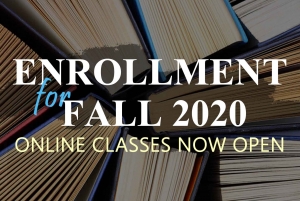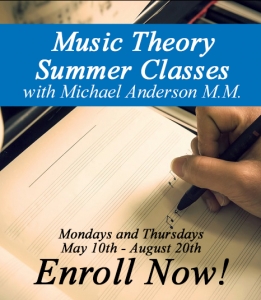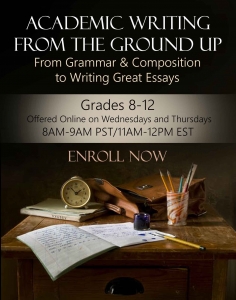 The Great Books Program consists of eight semesters (four years) of online classes meeting 2 hour per week, September-May, discussing the reading from one of the great classics of Western civilization – Great Books – done that week. The syllabus in the sidebar gives program details. Students do the weekly Great Books reading and meet for a two-hour weekly discussion with two highly experienced moderators very familiar with the readings, and up to 22 students online, including some from various States and often from various countries. 1800-2000 word essays are required each semester. Students must pass an oral exam online at the end of each semester.
The Great Books Program consists of eight semesters (four years) of online classes meeting 2 hour per week, September-May, discussing the reading from one of the great classics of Western civilization – Great Books – done that week. The syllabus in the sidebar gives program details. Students do the weekly Great Books reading and meet for a two-hour weekly discussion with two highly experienced moderators very familiar with the readings, and up to 22 students online, including some from various States and often from various countries. 1800-2000 word essays are required each semester. Students must pass an oral exam online at the end of each semester.
The classes are conducted in a conversational or Socratic format. Our method of teaching by conversationally discussing questions and answers in a spirit of mutual inquiry and discovery dates back to Socrates and is at the heart of the Great Books and classical traditions. It leads students to develop and practice the liberal arts of listening, speaking, reading and writing as well as the habits of reflective, critical thinking. In this environment students begin to develop their thoughts and insights with care and confidence and learn how to express those ideas in the naturally delightful and liberating experience of genuine learning. In this way students gain understanding of their own natures and the nature of the world in which we all live. This makes for a better, examined and thoughtful life, a point on which all the sages who wrote the great books agree. Visitors are welcome to attend the classes to experience them. We have some audio clips of the classes classes posted online.
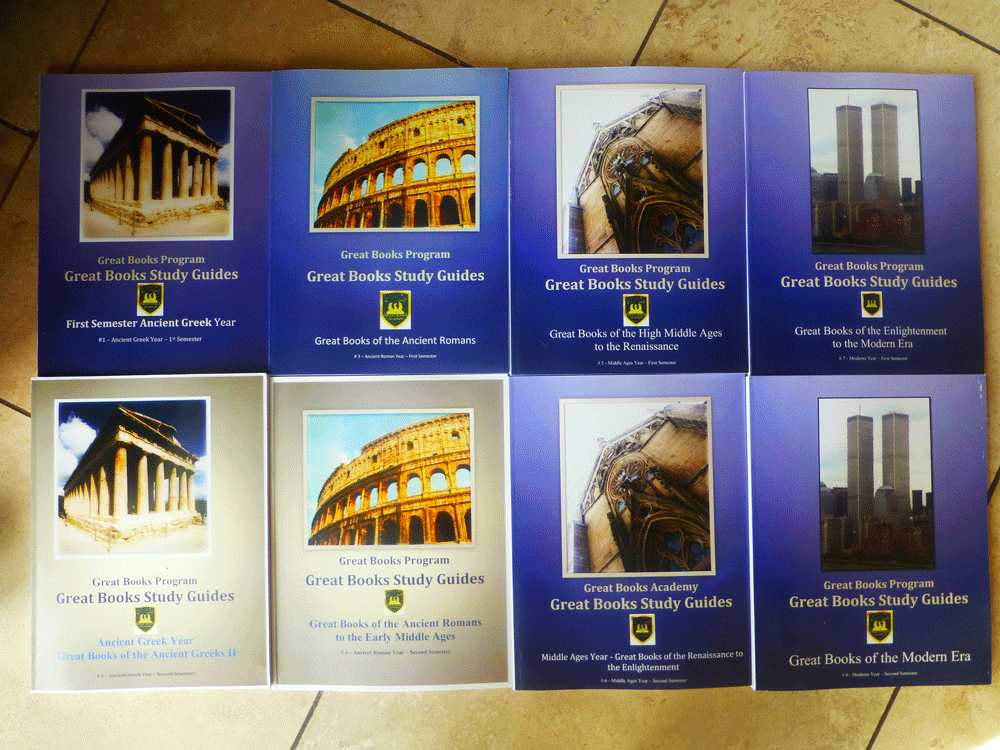 There are two modes to enroll and be in the classes: either for high-school-level credit, or for college-level credit (which also includes high school credit). We refer to these two modes of participation and enrollment as the high-school-track and the college-track. In addition to the study described above, college-track students must submit extensive weekly answers – mostly of the short essay-type – to the Great Books Study Guide questions which accompany each reading.
There are two modes to enroll and be in the classes: either for high-school-level credit, or for college-level credit (which also includes high school credit). We refer to these two modes of participation and enrollment as the high-school-track and the college-track. In addition to the study described above, college-track students must submit extensive weekly answers – mostly of the short essay-type – to the Great Books Study Guide questions which accompany each reading.
Two 1800-2000 word essays per semester are required of college track students. These are graded for content as well as for English language arts, including grammar, syntax, spelling, vocabulary and style. These essays together constitute ten percent (10%) of the semester grade. Students must pass an oral exam online at the end of each semester. The extensive weekly grading, the coordination with colleges, more involved assessment and so on, make the college-track tuition considerably more than the high-school-track. Students in the classes are generally unaware which students are doing it on the high-school-track, and which on the college-track, as it makes no difference in the online classes where they come into contact.
Students must be at least 14 years of age (or 9th grade) to enroll in the Great Books Program. There is no upper age limit. The magnificent quality of the books read and discussed –which Dr. Adler called the “backbone of a liberal education – invariably elevate the conversation and enlighten the intellects of participants. The specific readings selected are arranged chronologically beginning around Homer’s Illiad about ancient Greece (1st year), and continue through ancient Rome (2nd year), the Middle Ages (3rd year), and conclude in our time (Modern or 4th year). This is typical of Great Books programs at colleges and universities.
We have been doing this since our founding in 2000 A.D. We have had thousands of students, in over 40 countries, many of whom have graduated and attend numerous colleges and universities. Our program was successfully reviewed by the American Council on Education (ACE) which recommended it for 48 hours of college level credit. The American Council on Education’s College Credit Recommendation Service (ACE CREDIT) has evaluated and recommended college credit for 8 courses (totaling 48 credit hours – 6 per semester) of our Great Books Program. The American Council on Education, the major coordinating body for all the nation’s higher education institutions, seeks to provide leadership and a unifying voice on key higher education issues and to influence public policy through advocacy, research, and program initiatives. For more than 30 years, colleges and universities have trusted ACE CREDIT to provide reliable course equivalency information to facilitate their decisions to award academic credit.
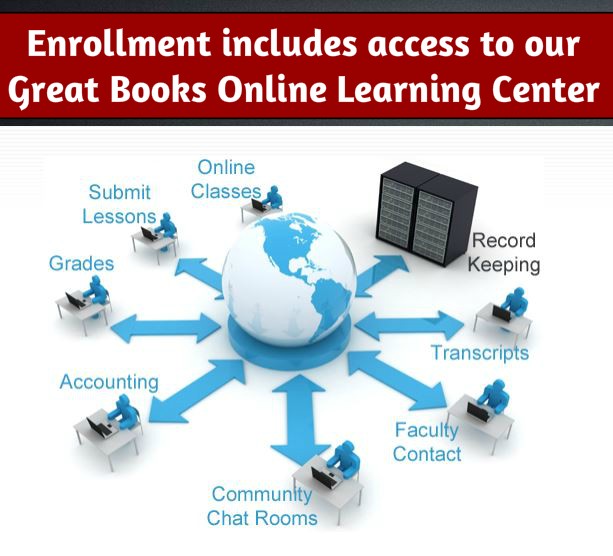 The Great Books Program is a purely distance education program with only minimal technical support staff needed to assist its professors who moderate our weekly, online, live-audio (i.e., not recorded, no delayed “chat” rooms) classes from their homes or offices around the country. This dramatically reduces costs thus enabling more students to attend and complete these high school/college level Great Books courses who would otherwise not be able to do so.
The Great Books Program is a purely distance education program with only minimal technical support staff needed to assist its professors who moderate our weekly, online, live-audio (i.e., not recorded, no delayed “chat” rooms) classes from their homes or offices around the country. This dramatically reduces costs thus enabling more students to attend and complete these high school/college level Great Books courses who would otherwise not be able to do so.
The Great Books Program students do not need to be enrolled in the Angelicum Academy, nor to have come from that program, nor to have had the 3-8th grade Socratic classes. The Great Books Program is operated independently of these, though they were designed to dovetail. Most of our students have not come from the Angelicum Academy – they come from many programs, from charter schools, from public or private schools, and from homes not using any formal homeschool program. Over the years some schools have adopted all or parts of our curriculum.
Many years ago – from the Middle Ages to modern times – the Bachelor of Arts (BA) degree signified completion of the secondary level of education (following the elementary or primary level) and so readiness to enter into the third level of formal education – the university, for specialization in one’s chosen field. With that background in mind, Dr. Mortimer J. Adler wrote:
“If I had any hope that in the foreseeable future, the educational system of this country could be so radically transformed that the basic liberal training would be adequately accomplished in the secondary
[i.e., high] schools and that the Bachelor of Arts degree would then be awarded at the termination of such schooling, I would gladly recommend that the college be relieved of any further responsibility for training in the liberal arts… if we are going to have general human schooling in this country, it has to be accomplished in the first twelve years of compulsory schooling…it would be appropriate to award a bachelor of arts degree at the completion of such basic schooling. Doing so would return that degree to its original educational significance as certifying competence in the liberal arts, which are the arts or skills of learning in all fields of subject matter.” – Jacques MaritainJacques MaritainPhilosopher Jacques Maritain held virtually the identical view as Dr. Adler on this matter: “I advance the opinion, incidentally, that, in the general educational scheme, it would be advantageous to hurry the four years of college, so that the period of undergraduate studies would extend from sixteen to nineteen. The BA would be awarded at the end of the college years [at 19 years of age], as crowning the humanities…” (Education at the Crossroads)
For example, in colonial America, before entering school at the age of fourteen or fifteen, students were expected to be able to speak Latin, and in college they were fined for not speaking in Latin, except during recreation. Latin was the language of most of their textbooks and lectures. The New Testament Greek was required for admission, and in Greek they also studied Homer and Longinus. In Latin the chief authors were Cicero, Vergil, and Horace. A continued interest in the classics was usual. “Every accomplished gentleman,” says Wertenbaker, “was supposed to know his Homer and his Ovid, and in conversation was put to shame if he failed to recognize a quotation from either.” Self-made men, like Benjamin Franklin, without the benefit of college, derived more from the ancient world than one would expect, but the more typical Founding Fathers meditated long and deeply on the ancient patterns of democracy and republics, and Jefferson was only expressing a frequent view of his time when he said of ancient literature: “The Greeks and Romans have left us the present models which exist of fine composition whether we examine them as works of reason, or style, or fancy… To read the Latin and Greek authors in the original is a sublime luxury.” The history, philosophy, and literature of the ancients did not seem remote or antiquated, but intimately present because permanently enlightening. -Image of America, Prof. Norman Foerster (University of Notre Dame Press, 1957)
In a 1970 appearance on the TV show Firing Line, hosted by William F. Buckley, Jr, Dr. Adler made the same point that liberal education, the backbone of which is study of the Great Books (not student-selected electives), should be completed by the end of secondary (high) school:
“I think the curriculum for liberal studies should be completely fixed. There should be no electives at all. I do not think the student is in any position to make choices about what he should study. I do not think his interests make any difference. They are all human beings; they are all going to become citizens; they are all going to have lots of free time. I think electives – the choice of specialization – should come after the liberal arts degree. I think the liberal arts degree is given four years too late. I would take American schooling and cut it down , and make it European in this sense: six years of elementary schooling; six years of secondary (lycee, gymnasium – high school); the collegiate (i.e., the BA [Bachelor of Arts]) degree coming at the end of that [i.e., at the conclusion of secondary education – 12th grade in the US]…I might extend that by taking [into account] the differences in the population: I might have the very brightest twelve years [i.e., through 12th grade] ; for the next level thirteen years; and the last, fourteen years, but not more than fourteen.”
Twenty years later, in 1990 Adler reaffirmed his view that the Great Books – the “ backbone of liberal education” as Adler called them – should be studied in the high school years, before age eighteen: “As far as the United States is concerned, the reorganization of the educational system would make it possible for the system to make its contribution to the liberal education of the young by the time they reached the age of eighteen…The tremendous waste of time in the American educational system must result in part from the fact that there is so much time to waste.” (The Great Conversation by Dr. Mortimer J. Adler; 2nd Ed., 1990, p.55; Encyclopaedia Britannica, Inc., Chicago)
Adler wrote in his autobiography, although younger than the College students, “the high school students did just as well [in the University of Chicago Great Books Program]; in fact, having had less schooling, they were less inhibited in discussion.” I’d say that it was not that we’d had less schooling but that we’d had U-High (high school at the U. of Chicago-run University high school – in other words they were prepared) schooling, which encouraged independent questioning and expression. -George McElroy, (BA’38, MA’39, graduated from U-High in 1934)
Ten years later, taking Dr. Adler’s words and personal encouragement to heart, in 2000 AD we developed The Great Books Program for students high school and college age and up. Much like the AP science courses for which high school students can earn college credits for completing courses of college level content and rigor, The Great Books Program allows willing students to gain a broad, liberal (i.e. from liber or libertas – liberty, or freeing from ignorance) education in the humanities through the study of the great books while in high school or college, via distance education, for college credit.
“Reading the Great Books had done more for my mind than all the rest of the academic pursuits…it is the best education for the faculty as well as for the students; the use of original texts is an antidote for survey courses and fifth-rate textbooks; and it constitutes by itself, if properly conducted, the backbone of a liberal education.” – Dr. Mortimer J. Adler
Studies by another Nobel-Prize winning (2000) economist at the University of Chicago, James Heckman, support the notion that healthy learning environments (which home education is generally acknowledged to provide most homeschoolers) found that “enriched environments” of learning enhanced IQ: “But that’s because when a kid is in a program, he’s being enriched and being enhanced… there is a [IQ] fade out that occurs when people get out of these enriched environments… We’re so used to thinking of IQ as being genetically given, used to thinking of these traits as somehow embedded at birth, but they’re not. The whole literature in genetics is now talking about gene-environment interactions: epigenetics.” Public schools and many private ones too often provide impoverished learning environments with poor materials, as if the learning environment did not matter – Heckman’s studies show it does.
Heckman wrote: “When you raise Rhesus monkeys — they share about 95 percent of humans’ genes — with a form of disadvantage, you affect 23 percent of all their genes. The genes are there, but the genes themselves don’t do anything. So you can have two identical monkeys, one raised in adverse conditions, another one raised in good conditions, and 23 percent of their genes will be different. The fact of the matter is, environment matters.
College Student reading book outsideWe do know roughly that the early years are very important and the later we wait, the harder it is [to enhance IQ]. We know there are a lot of differences genetically; there are a lot of differences that emerge. I’ll give you an example of gene-environment interaction. James Q. Wilson and Richard Herrnstein wrote a book called “Crime and Human Nature” about the determinants of crime. They said there is a genetic predisposition for crime, and there is! Have you heard about the MAOA gene?
If you go to the State Prison of Georgia or any other prison you’re going to find an overabundance of what are called “MAOA genes.” This gene is very predictive of violence, especially early onset violence. But it turns out — and this is an amazing finding, within the last several years — if you take two individuals with the same MAOA gene, one raised in a middle class environment, one raised in an environment with a tremendous amount of violence in the background and not much family support, it is only in the latter environment that the MAOA genes show any predictive power for criminality. In the middle class environment, it’s as if it never was there. That’s a powerful gene-environment interaction. And that’s just one gene! When you’re thinking about all of the genes we have and that 23 percent of all of them could be affected by these early environments.”
Genes are very important, but the environment in which genes are expressed is often your destiny. Heckman writes: “ I think [environment] is powerful. You can shut down the operation of a gene, because certain aspects of the gene will never manifest themselves, or certain negative aspects can be reinforced by it. The gene is still the same but it can be shut down, or it can be enhanced.
We can change who we are. We can improve ourselves in various ways and we can give ourselves possibilities. What I’m thinking of is a sense of capabilities. It’s basically saying, give a child more possibilities to do whatever he or she wants to do with their life. So you give them more capacities: more capacities to solve math problems, more capacities to do music, etc.” [It Pays to Invest in Early Education Says a Nobel Economist Who Boosts Kids IQ; Making Sense – Feb. 22,2013]. We believe a program of study of the world’s greatest literature covering a wide range of human endeavor, is precisely the formula for enriching students’ learning environments and expanding their capabilities and sense of possibilities to pursue what is great in a true sense, and hence good.

